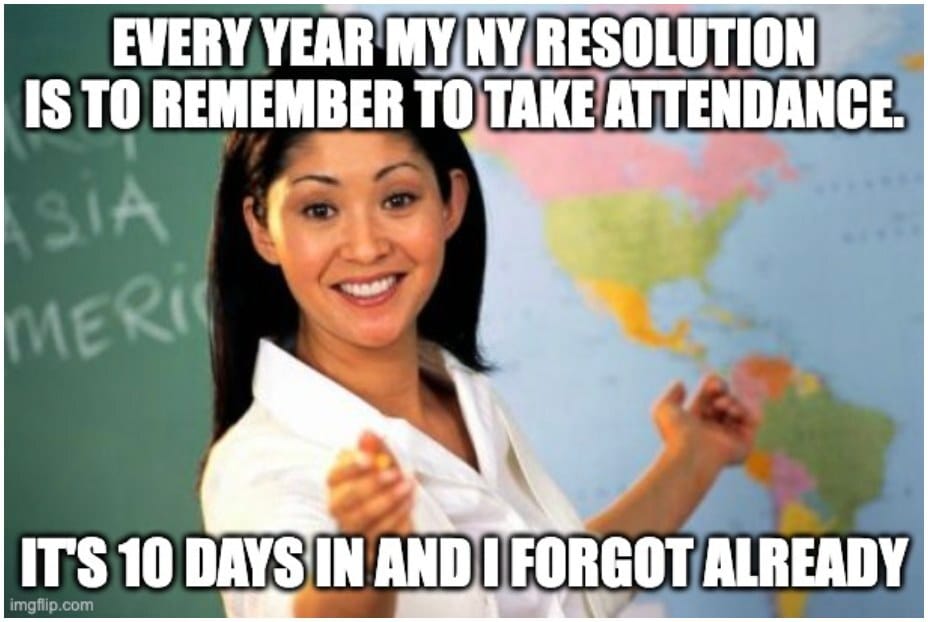💥 I'm blowing up how I grade
Now that I’m back in the classroom teaching high school Spanish, some things are different.
One of them is grading — something I haven’t had to actively manage in about eight years.
I read a book recently — The Infinite Game by Simon Sinek — that has me thinking differently about grading and motivation.
I’ll be interested to see what you think … after you read it, hit reply and let me know!
Inside:
📙 A readable page-turner about AI in EDU
👀 DTT Digest: AI feedback, winter poetry, reflection
💡 The Big Idea: Why (and how) I’m blowing up how I grade
🗄 Template: Fun in the snow activity
😄 Smile of the day
👋 How we can help
📙 A readable page-turner about AI in EDU

It’s here. It’s changing the way we work. And it’s going to change things in the classroom.
Artificial intelligence.
What are its implications on the classroom?
What about cheating and plagiarism?
Where is all of this headed?
Get answers in my book, AI for Educators. It’s a quick, engaging page turner that’ll help you start moving forward.
“Matt’s timely, honest, and optimistic guide is just what we all need to get started with AI and get excited on how it can be used in the classroom. […] I think this guide is timeless because we are always going to need tomorrow glasses!” ⭐⭐⭐⭐⭐ (Amazon customer)
PS: We offer bulk order discounts — and we even have book study resources! Email [email protected] for details!
DTT Digest
4 teaching resources worth checking out today
📢 Improved AI feedback in Curipod — Curipod (curipod.com) has improved its AI feedback slides. Students write and Curipod uses AI to analyze the response and provide real-time feedback. Curipod has several pre-made feedback slides — or you can create your own.
☃️Winter poetry video lesson — Explore two ready-to-use video lessons from Edpuzzle. Students can analyze literary elements in "After the Winter" by Claude McKay or “Stopping by Woods on a Snowy Evening” by Robert Frost.
💭 Get your youngest learners reflecting on the year — PBS Learning Media has some great resources for our K-2 learners. This downloadable New Year Reflections worksheet has students look back on last year and set goals for the next.
☘️ Diffit free premium trial extended to March 1 — Diffit allows you to create leveled resources from links, YouTube videos, PDFs, pasted text and more. You can customize the resources with vocabulary, add questions at different DOK levels, and translate them. Then turn your content into “just right” activities with our library of high-quality, student-ready exports.
💡 THE BIG IDEA 💡
💥 Why (and how) I’m blowing up how I grade

When I first started teaching, I wanted to make sure that my assessments meant something. Reflected my students’ skills.
Informal assessments like activities. More formal ones like quizzes and tests. All of it.
They needed to be challenging. Rigorous.
Now?
That’s all starting to slide down the importance list just a little. (Go with me …)
I recently read Simon Sinek’s book, The Infinite Game.
When he described the difference between “finite games” and “infinite games,” it made me rethink all of this.
“Finite Games”
Sinek calls “finite games” those that have a clear set of rules. A winner and/or loser. A defined endpoint. Hence: “finite.”
Think chess. Baseball. Football. Start/finish. Win/lose.
People can take this approach to business. To politics. To life.
Sometimes, classwork can feel like a “finite game.”
Early in my career, I saw all of my assessments — my checks for understanding — more like finite games.
It’s like I was saying, “Here’s what I expect. The line in the sand. Get there and you win (aka ‘you get the grade.’) Fall short? Well, you fall short.”
With a “finite game” approach, I started to notice a few things ..
Some of my students developed an “I can’t” mentality. It became their identity — “I’m not good at Spanish.” After they set that identity, it was hard to get them back.
My “finite game” approach seemed to benefit my strong students the most. It didn’t support my struggling students or “middle” students. It further created a divide.
The “finite game” got some students focused more on collecting points and less on learning.
This wasn’t the classroom I wanted.
Then Sinek described “infinite games.” Wow. THAT was what I was looking for.
I didn’t want winners and losers.
I wanted my students and me to keep playing the game.
“Infinite Games”
In “infinite games,” the players aren’t trying to win. They just want to stay in the game. They want to keep playing the game.
Immediately, this approach resonated with me.
It changed how I created assessments, assignments, quizzes and tests.
I wanted to keep “playing the game” with my struggling students and those in the middle. I knew that if I could keep them engaged and getting repetitions with the content, they would improve.
I didn’t want to lose those students to the “I’m not good at Spanish” identity … because I usually couldn’t get them back.
So, what did I do?
I made all of my assessments a little more accessible. A little less challenging. It didn’t mean my students were learning less. I lost less students to the “I can’t” mentality. Plus, my stronger students — who were more motivated by grades — got what they wanted motivation-wise.
With more students feeling the “yes I can” mentality, I saw better engagement with in-class practice. I had more students dialed into our in-class practice. Therefore, we got more value out of every class period.
With more value out of every class period, the need for homework became less and less. (Personally, I have serious doubts about the effectiveness and return on traditional homework anyway. You can read about that in my book, Ditch That Homework.)
In the end, more of my students have kept playing the game with me — and kept progressing in their skills.
Creating a better game
If making my assessments less challenging made you look at me sideways, that’s OK.
Here’s one more case for it.
Recently, we have more and more students who are just not motivated by traditional grades. Points in a gradebook.
If that’s our main motivation — “do what I say and you’ll get the grade” — that proposition just doesn’t work for lots of students.
To be clear: I’m not advocating low standards — or not challenging students.
I’m advocating setting the goal line in a place where students can reach it.
“But what if the state test sets the goal line farther away than that?”
Setting our expectations (our goal line) unreasonably high won’t help students reach them — especially if they stop playing the game. If they give up. If they adopt an “I’m not good at this” identity.
Instead, we do what we can to keep them playing the game.
They keep stay engaged because they think “I can.”
That way, they’re still progressing.
The infinite game.
The infinite CLASSROOM.
Do what it takes to keep playing the game.
Because the more we play the game, the more our students grow and develop.
🗄 Template
Learn about Canva EDU with this winter activity
Try this 'Fun in the Snow' activity, created by Tisha Richmond, to introduce your students to CanvaEDU!
Have little learners? Build the snowman together step-by-step to demonstrate, then students can create a snow scene on their own. Older students, or those with more experience with Canva, can either choose one or build both on their own.
No Canva? No problem! We downloaded the template into Google Slides for you.
😄 Smile of the day
It shouldn’t be that hard to remember… yet it is.

h/t Monica Lopez via Teacher Memes Facebook group
👋How we can help
There are even more ways I can support you in the important work you do in education:
Read one of my six books about meaningful teaching with tech.
Take one of our online courses about practical and popular topics in education.
Bring me to your school, district, or event to speak. I love working with educators!


